Nigeria’s President Muhammadu Buhari, during his Democracy Day speech on Saturday, claimed that his administration has successfully lifted 10.5 million Nigerians out of poverty in the last two years but data shows Nigerians have been worse off during this period, BusinessDay has reported.
“In the last two years we lifted 10.5 million people out of poverty – farmers, small-scale traders, artisans, market women, and the like,” Buhari said.
The poverty rate, unemployment rate, inflation rate, and economic growth have been unimpressive, an indication that shows that Nigerians might have grown poorer in the past two years.
“Clearly, the Covid-19 impact survey by the National Bureau of Statistics has shown that more Nigerians fell below the poverty line over the past two or three years,” said Ayorinde Akinloye, an analyst at United Capital Plc.
“You can’t say you are pulling more people out of poverty when the unemployment rate has jumped to record levels under his administration. That is just a political statement.”
Gbolahan Ologunro, an economist at Lagos-based Cordros pointed out that the administration appears to have made some efforts to alleviate poverty and unemployment. In that regard, the administration might come to the conclusion that the programs have impacted the population positively.
“But the claim that 10 million people have been lifted out of poverty does not coincide with economic data. The inflation rate, unemployment has been largely unimpressive over the last four years,” Olugunro said
During his speech, the president mentioned that his administration has a National Social register of poor and vulnerable households, identified across 708 local government areas, 8,723 wards, and 86,610 communities in the 36 States and the FCT. He claimed that the administration’s conditional cash transfer program has benefited over 1.6 million poor and vulnerable households comprising more than 8 million individuals. This provides a monthly stipend of N10,000 per household.Loading…
However, these 7 charts show that Nigerians have grown poorer during the Buhari administration.
Poverty rate
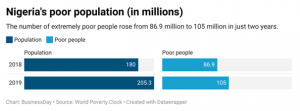
Despite the interventions of the government, an additional 18 million Nigerians were dragged below the poverty line in two years. An individual is classified as poor if the person earns below $1.90 or (N782) per day, according to the World Bank.
The National Bureau of Statistics (NBS) also reported that 40 percent of people who live in Nigeria lived below the poverty line of N137,430 ($381.75) a year, representing 82.9 million people. On a monthly basis, this is N11, 452 and N381 on a daily basis.
According to the World Bank, the economic recession and the pandemic pushed 11 million Nigerians in poverty in 2020 and the number is projected to increase to 20 million by 2022.
Economic growth
An economic growth that fails to match population growth means the economy is not creating more opportunities to accommodate a fast-rising population, a sign of worsening poverty levels.
With two economic recessions in just five years, Nigeria’s growth rate has failed to match its average population growth rate of 2.6 percent.
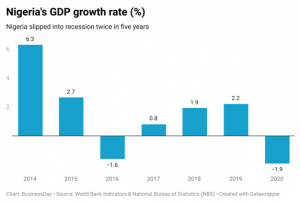
GDP per capita growth rate
For six straight years, Nigeria has recorded a negative Per Capita GDP growth rate. This means Nigerians have grown poorer during the last six years.
Per Capita GDP shows how much economic production value can be attributed to each individual citizen. It breaks down a country’s economic output per person and is calculated by dividing the GDP of a country by its population.
Nigeria recorded a Per Capita GDP growth of -4.57 percent in 2020, its worst contraction in more than six years, a painful squeeze for Nigerians whose average incomes are about $2000, less than half the $5000 of South Africans.
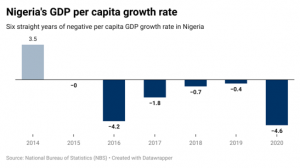
Inflation
Inflation has risen from 11.3 percent in April 2019 to 18.1 percent in April 2021. Nigerians also cannot afford to buy as much as they used to as food costs continue to surge to record levels.
Unemployment
Nigeria’s unemployment rate has risen to 33 percent in Q4 2020 from 21.8 percent in Q1 2018. More jobless Nigerians means more people in extreme poverty.
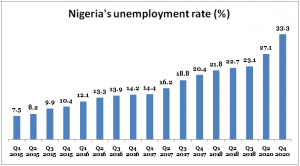
Exchange rate
Exchange rate has risen from an average of N306/$ in 2018 to N411/$ in 2021. As the naira weakens against the dollar, products become more expensive.
In the last two years, the exchange rate has weakened 34 percent, a sign that Nigerians have gotten poorer especially as income levels stay the same.
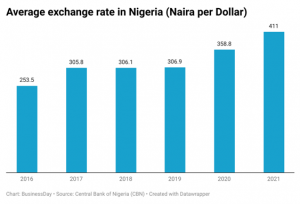
▪︎ By BusinessDay
